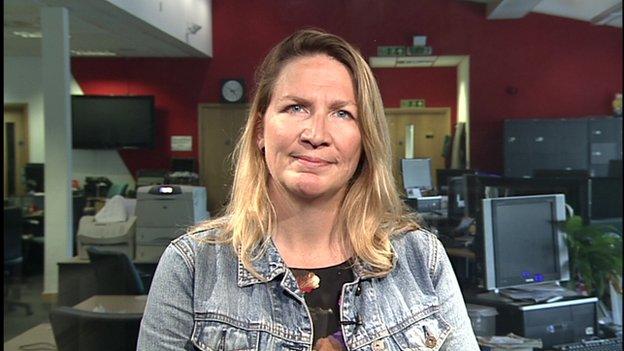Women bishops: Church's second chance to decide
- Published
Ordained clergy and General Synod lay members give the case for and against
The Church of England has begun a debate ahead of a crucial vote to decide whether to allow women into its top ranks as bishops.
Its ruling General Synod will vote on the issue - 18 months after a previous attempt was blocked.
It was passed by the Houses of Bishops and Clergy but was six lay members' votes short in the House of Laity.
The Archbishop of Canterbury Justin Welby called on the Synod to "embrace a radical new way".
Ahead of his address during the debate, which lasted for about five hours, he said he was "hopeful" the Synod will approve the legislation.
Prime Minister David Cameron said he was in favour of women bishops and praised the Most Rev Justin Welby, for his leadership on the issue.
Archbishop Welby told the BBC's Andrew Marr programme on Sunday there was a "good chance" the first woman bishop would be announced by the end of 2015.
He added that, to the general public, the exclusion of women was "incomprehensible".
Church of England women priests
7,798
full-time C of E priests
1,781
are women
-
101 male C of E bishops
-
30 Anglican women bishops worldwide
-
21 years since first C of E women priests ordained
Realistic
Rowan Williams, the previous Archbishop of Canterbury, said the Church "lost a measure of credibility" over the failed 2012 vote when he was in post.
Justin Welby says he would be "delighted" to see a female Archbishop of Canterbury in his lifetime
Two years on, the composition of the Synod is unchanged but four of those who voted against the proposed change then have since said they will back the latest plans - potentially enough to swing the result.
During Monday's debate, chair of the House of Laity Philip Giddings, who was opposed to women bishops in 2012, said he would vote in favour.
He said the legislation offered "a new culture" and "a better way" that still observed the principles of the Church.
The Reverend Jody Stowell, from Harrow in north-west London, said lots of work had since been done to "improve relationships" between those on the Synod with differing opinions.
Mediation and conflict resolution experts were drafted in last year to help members resolve their differences.
But Ms Stowell added: "We would not say we are overly confident at all because it is the same set of people who voted it down in November 2012, so we have to be realistic about that."
Mary Judkins and Canon Simon Killwick debate new proposals to allow to become bishops.
This time around the proposals, external - to be voted on at York University - would allow traditionalist parishes unwilling to serve under a woman bishop to request a male alternative.
An ombudsman would arbitrate in the case of disputes.
Fr David Houlding, an Anglo-Catholic vicar and member of the Synod, said he would be voting against the legislation on principle.
But he conceded that if it failed for a second time it would be a "terrible, terrible disaster" for the Church.
"If it collapses and we have to do something different, I think the Church of England will divide," he predicted.
Susie Leafe, from the Christian campaign group Reform, said she did not want to see women bishops.
"We are looking for the Church to follow biblical principles," she said.
"That means having a set of bishops that serve the flock and are male."

Susie Leafe is a lay member of the Church of England's General Synod
Earlier in the week it was reported, external that if the proposal was rejected again, the Archbishop of Canterbury was planning to drive it through regardless, potentially by introducing legislation in Parliament via bishops in the House of Lords.
However, the archbishop has since said he could not impose female bishops and added: "It would be matter for the House of Bishops, I can't dictate it."

Women bishops debate
Many opponents believe women cannot be bishops because in their view scripture says a male figurehead is required
Supporters of the proposal say it would create a greater equality between the sexes within the Church
Opponents want safeguards, allowing male priests and bishops to look after parishes which request them
Supporters fear such a move would mean a bishop not having full authority in her own diocese
Instead of writing safeguards into the legislation, the latest proposals would be guaranteed by a House of Bishops declaration, external, with disputes ruled on by an independent reviewer, or "ombudsman"
Women bishops would alter the leadership profile of the Church of England, which is central to many state occasions and local ceremonies

The vote comes after 43 out of 44 dioceses - including two which were previously opposed - overwhelmingly backed the legislation.
Europe, the 44th diocese, failed to respond to the consultation in time.
However a "yes" vote later would likely deepen divisions in the Church over the issue as some of its members already dispute the authority of women priests.
Under the plans, a woman bishop would be able to ordain priests which some opponents say is not only unacceptable but theologically impossible.
If the legislation is approved, it would then go to the ecclesiastical committee of Parliament and the House of Commons and House of Lords.
The General Synod would then meet on 17 November to announce formally that women can be bishops.